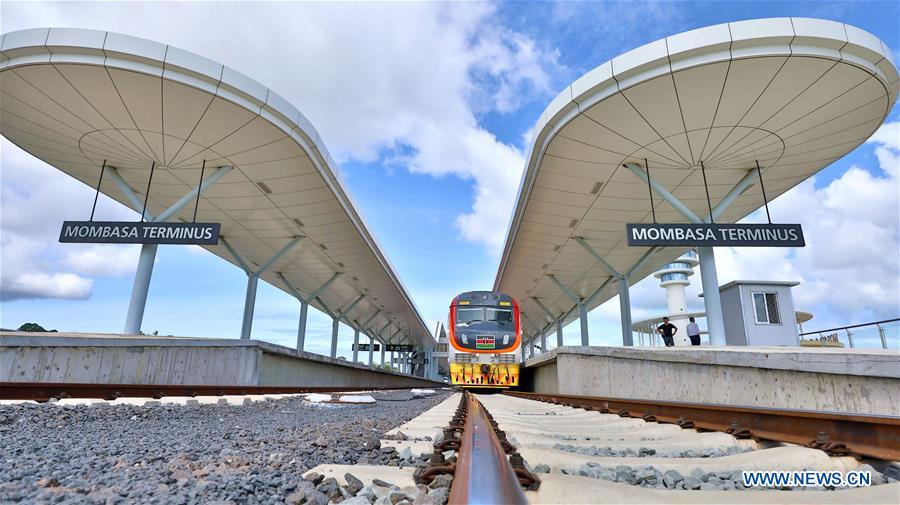Chinese-built SGR enlivens long-distance travel while injecting vitality into Kenya
Currently, four passenger and 18 cargo trains operate daily along the Nairobi-Mombasa Standard Gauge Railway (SGR) corridor, greatly boosting transport, commerce and tourism in east Africa's largest economy.
Lilian Otuma was in ecstatic mood at dawn on Saturday after securing a ticket to travel to the coastal city of Mombasa for the first time, using the Mombasa-Nairobi Standard Gauge Railway (SGR) passenger train.

A train of the Mombasa-Nairobi Standard Gauge Railway (SGR) is seen at the Mombasa Railway Station in Mombasa, Kenya, on June 1, 2018. [Photo/Xinhua]
The young mother proudly displayed her ticket as a large crowd of travelers mingled freely at the Nairobi terminus' ticket office, before proceeding to board the modern passenger train dubbed Madaraka Express.
Otuma's excitement was palpable in spite of the chilly weather, thanks to the realization that her maiden tour to Mombasa via the famous Madaraka Express was looming on the horizon.
Otuma was among hundreds of passengers who flocked the Nairobi SGR terminus to make a voyage to Mombasa for business, leisure or family reunions.
This was her first time to see a modern train, Otuma said, thanking China for the gift.
The 480 km SGR, which was constructed by a Chinese company, is transforming lives of ordinary citizens profoundly.
Statistics from the Chinese operator of this modern train service indicate that it had ferried an estimated 1.72 million passengers toward the end of August.
The train takes four and a half hours to shuttle from Nairobi to Mombasa non-stop and vice versa as opposed to an average of 10 hours while travelling on buses.
Trips aboard the SGR with several stops in between takes about five hours.
Currently, four passenger and 18 cargo trains operate daily along the Nairobi-Mombasa SGR corridor, greatly boosting transport, commerce and tourism in east Africa's largest economy.
The SGR train service operator has recently set up a sleek waiting bay at the Nairobi Terminus for first-class passengers where passengers are served with coffee and tea at no cost. A coffee shop was set up near the area for passengers traveling on second-class seats.
The company provides luggage trolleys for passengers in the SGR terminuses, and a service center has been set up to provide escort services to unaccompanied passengers with disabilities.
The SGR train service has been a catalyst for Kenya's socio-economic transformation since its launch more than a year ago.
The Madaraka Express had transformed movement of goods and people while stimulating investments along its corridor, James Macharia, Kenya's cabinet secretary for transport and infrastructure, told an occasion marking the SGR's first anniversary.
Kenyan youths in particular have been among the greatest beneficiaries of the SGR passenger and cargo train services thanks to the creation of thousands of new jobs.
Peterson Gitonga, a 30-year-old superintendent at the Nairobi SGR terminus, quit his previous job at a five-star hotel to work for Madaraka Express months before it started operation in late May last year.
"When I heard that the SGR train service was about to be launched, I decided to signed up for a train operations training that was conducted by Chinese tutors," said Gitonga, stressing that they taught him a lot of things about railway work.
"My greatest joy in this job is to witness how this modern train has transformed the country," he said.
Gitonga noted that the SGR train service has resonated with Kenyans as evidenced by nearly 100 percent bookings on most days, especially on weekends. "The project is very good for the country and has changed the fate of many people," he said.
Kenya's SGR project, which is an early harvest of the Belt and Road Initiative, has positioned the country as an unrivalled transport, logistics, manufacturing and trading hub in the region.
China Communications Construction Company (CCCC), in its Kenya SGR Corporate Social Responsibility (CSR) report for the 2017/2018 period, said the SGR project injected strong momentum for social and economic development in the country by bringing real benefits to Kenyan people, generating 72,000 local jobs since the Mombasa-Nairobi part of SGR started construction in late 2014.
The mega infrastructure project has boosted Kenya's GDP by some 1.5 percent, providing jobs and facilitating skills upgrade for local youth, reducing logistic costs by 40 percent, according to the report.

